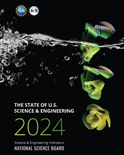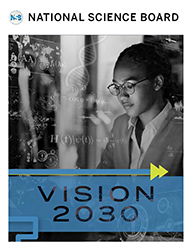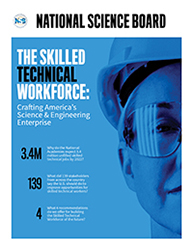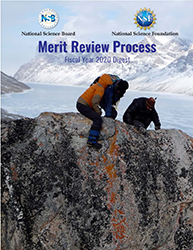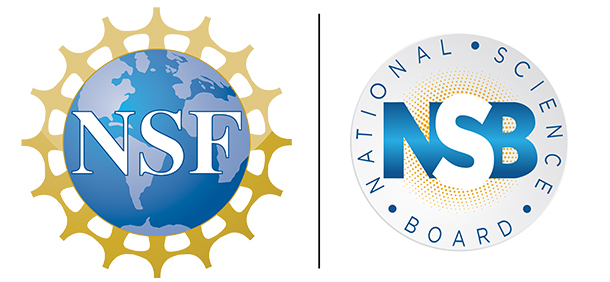
National Science Board to meet with skilled technical workforce stakeholders at Macomb Community College in Detroit

Macomb Community College (Credit and Larger Version)
April 17, 2018
Strengthening this critical segment of the U.S. workforce is a priority for Congress, the Administration and industry
The National Science Board (NSB) will hold a “listening session” in Detroit to hear the insights of local students, faculty, businesses and policymakers related to the skilled technical workforce, individuals who use science, technology, engineering and mathematics (STEM) knowledge and skills in their jobs but who do not have a four-year degree.
“Skilled technical jobs pay well and are found across the United States and in businesses large and small. But we know that employers in 80 percent of local areas say they have trouble filling jobs for these skilled technical occupations,” said Victor McCrary, Chair of NSB’s Skilled Technical Workforce Task Force and Vice Chancellor for Research at the University of Tennessee at Knoxville.
“We’re holding these listening sessions around the country to learn from people about the kinds of partnerships that really work between business and educational institutions and how we can remove some of the barriers and stigmas that too many students and workers confront in pursuit of meaningful, well-paying careers.”
NSB is the governing board of the National Science Foundation (NSF) and an advisor to Congress and the President on science policy issues. NSF is the only federal agency to support fundamental research and education across all fields of science and engineering.
According to NSF’s Science & Engineering Indicators 2018 report, Michigan has a higher percentage of people working in STEM occupations -- about 5.7 percent -- compared to the national average of 4.8 percent. Further, Michigan is one of eight states that performs between $15 billion and $30 billion in R&D per year.
“We’re excited to hold this session in the Detroit area, which is really a great example of how technology now permeates and drives so much of our economy,” said James Jackson, Chair of NSB’s External Engagement Committee and psychology professor at the University of Michigan. “When you look at the automotive industry—the dramatic advances in safety and how close we are to self-driving vehicles becoming the new norm—it really is an ideal place to have this conversation.”
The session will take place at Macomb Community College, a publicly funded and community-based higher education institution, in Macomb County, Michigan on the afternoon of Thursday, April 19, 2018.
The college is home to the NSF-funded Center for Advanced Automotive Technology. The Center is a collaboration between Macomb Community College and Wayne State University to provide educational opportunities to meet the expanding workforce needs of the automotive industry in advanced automotive technology. The institution also hosts one of 42 Advanced Technological Education Centers in the United States, which focuses on the education of technicians for the high-technology fields that drive our nation's economy.
WHAT: An event seeking local insights into workforce issues to catalyze and inform discussions about essential components of the nation's economy.
WHEN: Thursday, April 19 at 3:30 p.m.
WHERE: Macomb Community College, South Campus, John Lewis Student Center
WHO: NSB members and a diverse group of stakeholders, spanning industry, chambers of commerce, local and state government, educational institutions and students
CONTACT: Reporters seeking to attend should contact Nadine Lymn nlymn@nsf.gov or Sarah Bates at sabates@nsf.gov.
About NSB
Jointly the NSB and the Director pursue the goals and function of the NSF. The Director is the ex-officio 25th member of the NSB. The NSB establishes NSF policies within the framework of applicable national policies set forth by the President and Congress. NSB identifies issues critical to NSF's future, approves the agency's strategic budget direction and the annual budget submission to the Office of Management and Budget, and consults on new major programs and awards. The NSB also provides the President and Congress with a biennial report on U.S. progress in science and technology, Science and Engineering Indicators, providing comparisons to other nations in the areas of research and development, STEM education, and workforce training.
The President appoints Board members for six-year terms and may reappoint members for a second term. Members are drawn primarily from universities and industry and selected for their eminence in research, education, and records of distinguished service. Collectively, the Board represents a variety of science and engineering disciplines and regions across the United States.
Useful NSB Web Sites:
Home Page: http://www.nsf.gov/nsb
Media Contact: http://www.nsf.gov/staff/staff_bio.jsp?lan=nlymn&org=NSF
News: http://www.nsf.gov/nsb/news
Meetings: http://www.nsf.gov/nsb/meetings
Publications: http://www.nsf.gov/nsb/publications
Facebook: https://www.facebook.com/NationalScienceBoard
Twitter: Twitter: https://twitter.com/intent/user?screen_name=NSF_NSB
YouTube: https://www.youtube.com/channel/UCkrHRzuGSrPp2haQs0T_Pww
To view PDF documents, please download Adobe Acrobat Reader.
